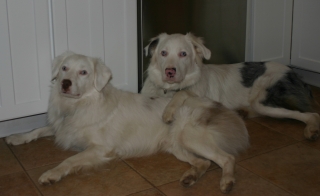Living With Multiple Dogs 101 – Part 2: Choose Wisely!

So you’ve decided to add to your canine family! Congratulations! Now that you have gotten this far, there are even more decisions to be made. You’ll need to choose your next dog very carefully. Hasty decisions can lead to heartbreak for everyone, so take your time. I don’t think you can go wrong with making a thoughtful decision, unless of course you are on a sinking ship!
Hopefully, after reading Part 1 of this series, you are getting the dog, not just as a buddy for your current dog, but also for yourself. So, you will need to consider the needs of your current dog as well as selecting a dog that will meet your needs and expectations.
First things first! Will you get a puppy, an adult or a senior dog? Each comes with a list of pros and cons. This decision will depend on how much time you have and what your lifestyle will permit. Puppies will require you to be home more often to guarantee success with housebreaking and to ensure adequate mental stimulation and socialization. What can your own dog handle? Sometimes older dogs won’t have patience for an exuberant puppy and sometimes a puppy can help an older dog feel young again. An adolescent will need plenty of exercise and a great deal of interaction and an adult may need your time to cope with the big changes that have occurred in their life. Finally, a senior may need some special TLC.
Where dogs are concerned, it is hard to choose with your head and not your heart. So it is probably a good idea to find someone you can trust who will help you assess the dog’s suitability for your home. You may want to consider taking a professional trainer along with you when you visit your potential new friend and especially when introducing him/her to your current dog.
What do you expect from your future dog? If your life’s ambition is to go dog-sledding, than a toy poodle or teacup Yorkie probably won’t do. Likewise, if you are looking for a lap dog that wants to be a couch potato with you, be sure not to get a high-energy breed or any combination or mixes thereof. How do you know if they are high energy? Ask a few people who own them.
You will have to be realistic. Dogs were originally bred to serve a function for humans. After all these years of selective breeding, it is unfair to expect the dog to adjust to a lifestyle for which he was not designed. I don’t go drag racing in my Honda CRV. That would be foolish. Whatever you think you can accomplish, it is foolish, and cruel when dealing with a living creature to place expectations that can’t be fulfilled without stress, pain or hardship.
Trainers know this, that is why we pick the dogs we do. We do it because we know what we want and we research what breeds will offer those possibilities. Ever notice how trainers and their dogs seem to be so well matched?
Finding the perfect match for your dog is probably the most difficult part. You will need to consider your dog’s personality and temperament. If you enjoy your current canine couch potato, then getting a rambunctious dog may drive you both nuts. However, if your current dog can’t keep up with your active lifestyle then a high energy dog, may offer him the chance to relax while the new dog is wearing you out!
The best way to determine what kind of friend your dog will enjoy is to look at his playmates. What kind of dog does he gravitate toward? What play style is he most comfortable with: chasing; mouth wrestling; wrestling; or body slamming? Maybe your dog isn’t really interested in playing. If so, then a gregarious housemate who can’t resist a good time, may be the wrong fit. If your dog is the submissive sort, than living with a bully won’t be fun for him. Neither will it be fun the other way around.
Finding the perfect fit can be a challenge, but as the owner of five happy dogs, I can tell you that it is more than possible! Do your research, take the time to let the dogs meet each other and ask a professional for advice. Stay tuned for Part 3: Making the Introductions!




